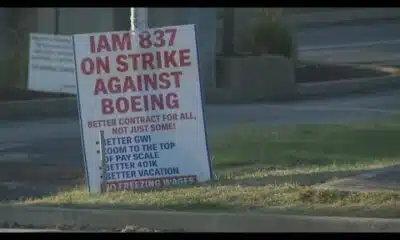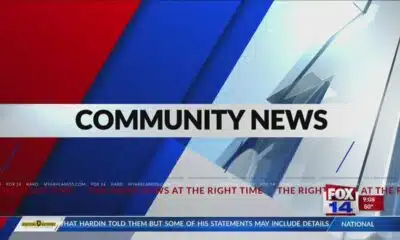News from the South - Louisiana News Feed
UNO faculty frustrated, frayed amid fiscal fiasco • Louisiana Illuminator
UNO faculty frustrated, frayed amid fiscal fiasco
by Piper Hutchinson, Louisiana Illuminator
February 5, 2025
NEW ORLEANS — The University of New Orleans Faculty Senate is fed up with the university’s budget chief and dealing with frayed internal relations amid a financial crisis at the school.
Facing a $10 million budget shortfall, UNO administration has undertaken a series of significant cuts to try to dig the university out of its hole. But faculty are increasingly frustrated with the lack of communication about the cuts and are directing their ire at Chief Financial Officer Edwin Litolff.
“Should we be ceding power to a non-academic, non-intellectual CFO,” Gregory Price, a faculty senator and economics professor, asked with a raised voice at a Faculty Senate meeting Tuesday. “Has our president ceded power and responsibility to our hack CFO?”
Litolff, who previously served in a similar role at Grambling State University, was hired by President Kathy Johnson last fall and tasked with cutting the university’s way out of its budget crunch. Litolff sees his job as trying to keep the lights on and the employees paid as the university “rightsizes” its budget.
UNO’s budget problems aren’t anything new. Johnson’s predecessor, John Nicklow, struggled with the budget during his tenure from 2016-23.
The contemporary fiscal problems truly began after Hurricane Katrina in 2005, when the university’s enrollment dropped from around 17,000 to around 6,000 and never recovered. For the fall 2024 semester, UNO’s total student body was 6,488.
Complicating matters were significant cuts to the entire state higher education system during Gov. Bobby Jindal’s two terms in office, from 2008-16. Those reductions switched the burden of funding colleges and universities from the state to the students, leading to significant tuition hikes across Louisiana.
UNO was slow to adjust its expenses to match its shrinking student body, a task that has forced Johnson to make drastic moves, including consolidating administrators, furloughing most employees and laying off staff.
While faculty cannot be furloughed, even tenured professors can be terminated in the face of a budget crisis.
GET THE MORNING HEADLINES.
CFO complaints
Frustrations with Litolff seemed to be shared by many faculty and staff. The usually empty library meeting room where the senate’s 27 members meet monthly was packed Tuesday with UNO employees desperate to hear updates about the university’s crisis — employees who cheered openly when senators were critical of Litolff.
Litolff has not yet responded to a request for comment for this report.
“I continue to have very low confidence in the administration, and … I’m particularly offended by Edwin’s behavior and his statement about Disneyland,” Max Krochmal, a history professor and senate parliamentarian said at the meeting.
Litolff’s comments about Disney came at a January University of Louisiana System Board of Supervisors meeting in which the board gave approval to the school’s plan to furlough staff.
“We will furlough whatever we need to make it to the end of the year,” Litolff said at the board meeting. “And if some people are taking off the whole month of June, plan your Disney vacation, go on your cruise, because that’s where we may end up being.”
Litolff also rubbed faculty the wrong way with a proposal for voluntary furloughing of faculty. After some professors expressed an interest in donating money or time to staff most impacted by the furloughs, Faculty Senate leaders were greeted with a plan to save the university $1 million if the entire faculty agreed to be furloughed.
“When we walked in that room, he started talking about [the faculty furlough proposal], he had dollar signs in his eyes,” Faculty Senate President Connie Phelps said.
Faculty senators agreed to “disabuse” Litolff of the notion they would be furloughed en masse to solve the cash flow issue and will opt instead to set up an emergency fund for furloughed staff.
Multiple senators agreed the fund should be managed by faculty rather than by Litolff.
“I don’t want Edwin to touch a penny of my money,” Krochmal said.
While most faculty complaints were centered on Litolff, Johnson was also the subject of concern, with Phelps and other senators arguing she has a limited view on the role of shared governance with faculty. The shared governance model delegates certain powers, primarily those dealing with academics, to faculty. Most universities divulge little authority to faculty senates.
YOU MAKE OUR WORK POSSIBLE.
Frayed relations
When one faculty senator suggested censuring Litolff, Phelps suggested doing so would be inadvisable.
Senators’ differing approaches to dealing with Litolff and the administration were another point of contention in the meeting, which at times descended into yelling.
Phelps easily defeated a vote of no confidence brought by fellow senator Roberto Barrios, an anthropology professor who charged Phelps and other members of the executive committee were withholding information and not sharing credit with him. Barrios stalked out of the meeting silently after the failed vote, which was conducted by secret ballot, having promised earlier in the meeting to resign from the senate if Phelps remained in office.
While other senators seemed embarrassed by Barrios’ move — several averted their eyes or put their head in their hands while he spoke against Phelps — there seemed to be a broad agreement that the senate was not acting to advance the faculty’s interest as the university slashed its way out of a hole.
“I do feel like our body is falling short, collectively,” Krochmal, the parliamentarian, said at the meeting. “I think we’re failing to communicate with the rank-and-file faculty about what we’re doing clearly, we’re failing to share basic information about what’s happening … at these upper level meetings that you all attend, and people are crying out for more information and for more action.”
While Phelps repeatedly called for moderation, other senators voiced calls for action that bordered on insurrection.
“Rebellion is always a choice, right?” Price said. “Death before dishonor.”
The student government representative on the senate, Joshua Trochez, said “rebellion might be needed” to push back against the UL System, which he believes is calling the shots in the university’s budget crisis.
Though a full rebellion and “storming” of the board does not seem to have broad appeal among the faculty, senators expressed a desire to have more of a presence at board meetings to provide a fuller picture of the university’s crisis than they believe Litolff and Johnson are providing.
YOU MAKE OUR WORK POSSIBLE.
Louisiana Illuminator is part of States Newsroom, a nonprofit news network supported by grants and a coalition of donors as a 501c(3) public charity. Louisiana Illuminator maintains editorial independence. Contact Editor Greg LaRose for questions: info@lailluminator.com.
News from the South - Louisiana News Feed
OPPJ Comprehensive Plan
SUMMARY: The Ouachita Parish Police Jury is conducting a series of community meetings to gather public input for their comprehensive plan guiding future growth. Police Jury members, including Larry Bratton from District D, emphasize the importance of reflecting residents’ voices in the master plan. Community members participated in interactive stations, allocating resources to priorities like infrastructure and downtown development, to help shape goals for the next 2, 5, and 20 years. Landscape architect Matt Pizatella and partners from Atlas support the effort. Bratton stresses that without proactive planning, the parish risks costly and less beneficial outcomes in the long term.
OPPJ Comprehensive Plan
News from the South - Louisiana News Feed
Drowned child recovers thanks to oxygen chamber, but insurance did not approve
SUMMARY: In 2018, Will Boyton’s 3-year-old son, Robert, drowned and was without oxygen for nearly an hour. Despite hospitals urging them to give up hope, Will insisted on hyperbaric oxygen chamber treatment, inspired by its success in brain injury cases. Robert began treatments at Harch Hyperbarics, showing rapid improvement: from unresponsive and bent backward to recognizing family and laughing within days. Over years, combined with stem cell therapy, Robert vastly surpassed his initial brain-dead prognosis. Though studies and treatments show promise in severe brain injuries, insurance refuses to reimburse these costly treatments, as the FDA hasn’t approved them.
For years, Medical Watch has covered adults and children with brain injuries, coming to New Orleans from around the world, for a treatment considered controversial.
News from the South - Louisiana News Feed
Wagers on touchdowns, strikeouts and even penalties: States eye limits on prop bets
by Kevin Hardy, Louisiana Illuminator
September 9, 2025
As a bankruptcy attorney, New Jersey Assemblymember Dan Hutchison said he sees clients “all the time” whose betting on football and baseball quickly leads to missed car payments, delinquent mortgages and, ultimately, bankruptcy.
The rise of live, in-game bets — in which a gambler could place more than 200 individual bets during a baseball game if they wager on each pitch thrown — has only amplified his misgivings.
“And I’m like, are you kidding me? I mean, they’re betting on the next pitch, the next play, and it’s constant,” he said. “There’s no pause. It’s just not healthy.”
Worried that those bets can worsen problem gambling and threaten the integrity of sports, Hutchison, a Democrat, introduced legislation to ban New Jersey gambling licensees from offering live bets on individual plays during sporting events.
That bill illustrates growing state interest in regulating proposition bets, commonly called prop bets, a form of sports betting that is popular with fans but worrisome for sports leagues and state officials nationwide.
Unlike wagering on which team will win or the point spread of a game, prop bets can center on the performance of an individual player or even a single play that doesn’t necessarily affect the outcome of a contest. Prop bets can include trivia, such as the color of the Gatorade dumped over the Super Bowl’s winning coach, or specific stats, like how many touchdowns a certain quarterback will score during a game or which team will score first.
Critics say prop bets are easier for athletes to manipulate than the outcome of an entire game. They also make individual players more susceptible to online harassment from gamblers and increase the frequency of betting, thus raising the risk of addiction.
Ohio’s Republican governor has called for the nation’s first outright ban on prop betting on professional sports. Already, at least 15 states ban prop betting in collegiate sports, according to data maintained by the American Gaming Association, a trade group.
The heightened focus on prop bets comes amid a rapid rise of legal sports gambling, which is operational in 38 states and the District of Columbia. (Missouri plans to launch its new voter-approved program this December.) While legal betting has boosted state revenues and reshaped sports fandom, Hutchison said bankruptcy attorneys across the country are getting a preview of the financial wreckage it can wreak.
He said some clients are so distraught, he worries about potential suicides related to out-of-control gambling debts.
“That’s the reality of what’s going on. But they don’t make it seem like that when they’re doing these commercials during the football games: It’s normal, everybody does it, if you don’t do it, you’re not enjoying yourself,” he said. “That’s the glamour side of it. I deal with the other side.”
The industry’s rapid rise
The liberalization of sports gambling was made possible by a 2018 Supreme Court decision to strike down a federal law prohibiting gambling.
Since then, legal gambling has transformed the fan experience and propelled sportsbooks into major industry players: Americans are expected to wager an estimated $30 billion in legal sports betting on the NFL this season, according to the American Gaming Association. With so much money and energy flowing into gambling, academic researchers are increasingly raising concerns about the mental and financial consequences.
“The speed at which gambling has been marketed and legalized in this country is way faster than guardrails have been set to protect consumers and to try to give resources for problem gambling,” said Stephen Shapiro, a University of South Carolina professor who researches sports gambling.
Shapiro said a potential ban on prop betting in Ohio would prove a “big step” in gambling regulation. But he expects fierce opposition from the industry and consumers alike.
“They’re very popular. They’re arguably as — if not more — popular than betting on just individual games,” he said. “ … So I think there’ll be some backlash, but I also think over the next few years … there’s going to be an appetite for setting guardrails.”
The speed at which gambling has been marketed and legalized in this country is way faster than guardrails have been set.
– Stephen Shapiro, a University of South Carolina professor who researches sports gambling
The American Gaming Association, which represents casinos and sportsbooks, says that such restrictions would only drive gambling to illegal venues such as offshore betting platforms, where consumers have no protections.
But some sports leagues are ready for more restrictions on prop bets. The NCAA, the governing body for major college athletics, has been pushing federal and state leaders to ban prop betting in college sports.
The organization says 1 in 3 high-profile college athletes has received abusive messages from gamblers — the majority directed toward basketball players during tournament season. Just 12 days after North Carolina legalized sports betting last year — including prop bets on players — the University of North Carolina’s Armando Bacot reported receiving more than a hundred abusive social media messages for not accumulating enough rebounds in a game.
Women’s basketball student-athletes received about three times the number of threats as men’s basketball student-athletes, according to the NCAA.
In a March awareness campaign, NCAA President Charlie Baker said the abuse threatens the well-being of student-athletes and the overall environment of college sports.
“We need fans to do better,” he said in a statement at the time. “We need states to do better and ban player props that target student-athletes and enable detrimental abuse.”
And professional teams have their own concerns. Last month, ESPN reported the NBA and its players union supported further limits on certain prop bets. This summer, MLB Commissioner Rob Manfred told reporters he would like to see some limits on prop bets.
“There are certain types of bets that strike me as unnecessary and particularly vulnerable,” Manfred said, according to Yahoo Sports.
Ohio Gov. Mike DeWine wants to ban prop bets after gambling allegations against Guardians players
In late July, Ohio Republican Gov. Mike DeWine called on state regulators to outright ban all prop bets — a request he asked the professional sports leagues to support.
DeWine’s proposal followed the suspensions of Cleveland Guardians’ pitchers Luis Ortiz and Emmanuel Clase, who are being investigated by MLB. A sports betting integrity firm reportedly flagged two specific pitches Ortiz threw in early June that coincided with a pair of prop bets.
“The harm to athletes and the integrity of the game is clear, and the benefits are not worth the harm,” DeWine said in a July news release. “The prop betting experiment in this country has failed badly.”
The Ohio Casino Control Commission, which regulates sports betting, did not answer Stateline’s questions about the governor’s request. On Aug. 13, the agency said its investigation into the suspicious betting on the Guardians was ongoing.
In a statement responding to DeWine, the American Gaming Association said the Ohio incident is actually evidence that regulated gambling works: “It detects potential misconduct, it reports it, and it helps hold bad actors accountable,” said Joe Maloney, the association’s senior vice president of strategic communications.
In an interview, Maloney said eliminating legal prop betting will only move that activity into unregulated markets with no transparency. He said prop bets are a reflection of sports fandom: Bettors like to wager on their favorite players notching touchdowns or 3-pointers.
“It increases a fan’s engagement with the game they love, with the player they love. And so the idea that eliminating a legal betting market for someone really interested in increasing the level of engagement is going to prevent that activity, it’s just not the case,” Maloney said. “ … It simply will just move the activity into the shadows.”
Leagues endorse some limits
But the leagues are pushing for certain parts of the game to remain off-limits in legal betting markets.
Major League Soccer, for example, successfully pushed Illinois regulators last year to ban wagering on whether yellow and red penalty cards will be shown during a match and whether a specific player will receive a yellow or red card penalty.
Similarly, the state in February banned prop bets on NFL player injuries, player misconduct, officiating assignments, replay results and the first play of the game, following lobbying from the league.
Illinois Gaming Board spokesperson Beth Kaufman told Stateline the regulatory agency doesn’t maintain a list of specific prop bets that are allowed. But the board does require licensees to receive approval from the agency for specific wagers offered, she said.
“The IGB regularly monitors ongoing trends and developments in the industry and in major sports for any possible impact to the integrity of sports wagering in Illinois,” she said in a statement.
The NFL has pushed for similar rule changes in other states.
During a late August news briefing on gambling, David Highhill, the league’s vice president for sports betting, said the NFL has consistently objected to certain bets that raise integrity risks and provide limited fan engagement. Those include bets about officiating or player injuries and bets that are controllable by a single player on a single play.
“So things like ‘will this kicker miss a field goal’ are things that we’ve worked collaboratively across the board with operators to make sure those types of wagers are not offered,” he said.
In New Jersey, Hutchison said he doesn’t want to ban all sports betting or even all prop bets. And he knows his bill targeting so-called micro bets — those live, play-by-play bets — will face opposition, both from the industry and sports gamblers.
An avid sports fan himself, he said he doesn’t waste his money gambling on his beloved Philadelphia Eagles: “They don’t build all of those casinos in Atlantic City and Las Vegas because they pay out winners,” he said.
He said he’s not looking to end legal sports betting, but does think New Jersey needs to instill consumer protections and have a meaningful policy conversation about the societal costs of gambling.
New Jersey lawmakers are also considering a separate bill to ban player-specific prop bets on college sports.
The Council on Compulsive Gambling of New Jersey says it has experienced a nearly 300% increase in calls to its problem gambling hotline since the Garden State launched legal sports gambling in 2018.
In a July statement, Luis Del Orbe, executive director of the nonprofit council, which contracts with the state on gambling addiction issues, urged lawmakers to approve the bill to ban live, in-game bets. The organization says those high-frequency bets can trigger instant dopamine releases in the brain’s reward system, fostering compulsive behaviors that can lead to addiction.
“By limiting the proliferation of micro betting, this legislation takes an essential step toward protecting citizens from the harmful effects of reckless gambling practices,” Del Orbe’s statement said.
Stateline reporter Kevin Hardy can be reached at khardy@stateline.org.
This story was originally produced by Stateline, which is part of States Newsroom, a nonprofit news network which includes Louisiana Illuminator, and is supported by grants and a coalition of donors as a 501c(3) public charity.
Louisiana Illuminator is part of States Newsroom, a nonprofit news network supported by grants and a coalition of donors as a 501c(3) public charity. Louisiana Illuminator maintains editorial independence. Contact Editor Greg LaRose for questions: info@lailluminator.com.
The post Wagers on touchdowns, strikeouts and even penalties: States eye limits on prop bets appeared first on lailluminator.com
Note: The following A.I. based commentary is not part of the original article, reproduced above, but is offered in the hopes that it will promote greater media literacy and critical thinking, by making any potential bias more visible to the reader –Staff Editor.
Political Bias Rating: Center-Left
The content presents a balanced view on the issue of sports betting regulation, highlighting concerns about problem gambling and the social costs associated with certain types of bets, particularly prop bets. It features perspectives from Democratic lawmakers advocating for consumer protections and regulation, as well as industry representatives warning against overregulation. The article also references bipartisan actions, including Republican officials supporting bans on specific bets. Overall, the piece leans slightly left by emphasizing public health and regulatory measures but maintains a generally centrist tone by including multiple viewpoints and avoiding partisan rhetoric.
-
News from the South - Texas News Feed6 days ago
Texas high school football scores for Thursday, Sept. 4
-
News from the South - Louisiana News Feed6 days ago
Portion of Gentilly Ridge Apartments residents return home, others remain displaced
-
News from the South - North Carolina News Feed6 days ago
Hanig will vie for 1st Congressional District seat of Davis | North Carolina
-
News from the South - Alabama News Feed6 days ago
Alabama state employee insurance board to seek more funding, benefit changes
-
Our Mississippi Home7 days ago
The Hummingbirds’ Last Hooray of Summer
-
News from the South - West Virginia News Feed6 days ago
WV Supreme Court will hear BOE’s appeal in vaccine lawsuit — but not right away
-
News from the South - Virginia News Feed6 days ago
Norfolk port project funding to be withdrawn amid federal cuts to offshore wind projects
-
News from the South - Georgia News Feed6 days ago
More details expected on ICE raid at south Georgia plant | Georgia










































